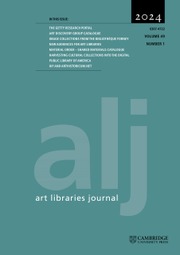The articles in this issue of Art Libraries Journal borrow heavily from two excellent conferences from 2022: the IFLA Art Libraries Section Satellite Conference in Dublin in the summer of 2022 and the Art Discovery Group Catalogue Project Conference: ‘Art Information: Reflection and the Future’, held in Munich in the fall of 2022. Both of these gatherings of librarians look to the future of art librarianship and all of its facets from different perspectives; looking forward by tracing the distance travelled in the past as well as looking at the new reality of twenty-first century art librarianship post-COVID.
Megan Sallabedra illuminates the remarkable achievements of the Getty Research Portal ten years from the date it went live and looks forward to how the Portal can aid researchers in the future; Jan Simane looks at the path the Art Discovery Group Catalogue has taken since its inception nearly 25 years ago and casts a hopeful eye at the future of the catalogue; Joëlle Garcia looks back at the historical beginnings of the picture collections at the Biliotheque Forney in Paris; Lucile Trunel, also of the Bibliotheque Forney, looks closely at the library's efforts to meet the expectations of new audiences and to forge new paths in attracting audiences. Mark Pompelia and Margot McIlwain Nishimura shine a light on the Rhode Island School of Design Fleet Library's discovery group and shared catalogue devoted to material sample collections – Material Order; Danielle P. De Jager-Loftus shows how the Digital Public Library of America (DPLA) helped to illuminate cultural heritage collections in South Dakota and how the DPLA enhances a patron's ability to discover and contextualize digital content. Johannes Wolff, Astrid Probst and Eva Bodenschatz show how the digital platform, arthistoricum.net, using the IIIF opensource viewer, creates a user-focused research environment.
These conferences provided important moments to both reflect on historical successes as well as to look to the future for ways to make meaningful achievements in an ever-changing landscape for art librarians.


